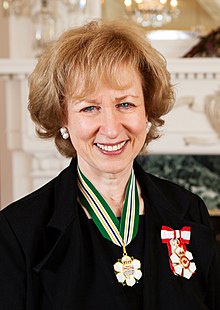Kim Campbell | |||||||||||||||||||||
|---|---|---|---|---|---|---|---|---|---|---|---|---|---|---|---|---|---|---|---|---|---|
 Campbell in 2012 | |||||||||||||||||||||
| 19th Prime Minister of Canada | |||||||||||||||||||||
| In office June 25, 1993 – November 4, 1993 | |||||||||||||||||||||
| Monarch | Elizabeth II | ||||||||||||||||||||
| Governor General | Ray Hnatyshyn | ||||||||||||||||||||
| Deputy | Jean Charest | ||||||||||||||||||||
| Preceded by | Brian Mulroney | ||||||||||||||||||||
| Succeeded by | Jean Chrétien | ||||||||||||||||||||
| Leader of the Progressive Conservative Party of Canada | |||||||||||||||||||||
| In office June 13, 1993 – December 14, 1993 | |||||||||||||||||||||
| Preceded by | Brian Mulroney | ||||||||||||||||||||
| Succeeded by | Jean Charest | ||||||||||||||||||||
| Minister of National Defence | |||||||||||||||||||||
| In office January 4, 1993 – June 25, 1993 | |||||||||||||||||||||
| Prime Minister | Brian Mulroney | ||||||||||||||||||||
| Preceded by | Marcel Masse | ||||||||||||||||||||
| Succeeded by | Tom Siddon | ||||||||||||||||||||
| Minister of Veterans Affairs | |||||||||||||||||||||
| In office January 4, 1993 – June 25, 1993 | |||||||||||||||||||||
| Prime Minister | Brian Mulroney | ||||||||||||||||||||
| Preceded by | Gerald Merrithew | ||||||||||||||||||||
| Succeeded by | Peter McCreath | ||||||||||||||||||||
| Minister of Justice and Attorney General | |||||||||||||||||||||
| In office February 23, 1990 – January 3, 1993 | |||||||||||||||||||||
| Prime Minister | Brian Mulroney | ||||||||||||||||||||
| Preceded by | Doug Lewis | ||||||||||||||||||||
| Succeeded by | Pierre Blais | ||||||||||||||||||||
| Minister of State (Indian Affairs and Northern Development) | |||||||||||||||||||||
| In office January 30, 1989 – February 22, 1990 | |||||||||||||||||||||
| Prime Minister | Brian Mulroney | ||||||||||||||||||||
| Minister | Pierre Cadieux | ||||||||||||||||||||
| Preceded by | Bernard Valcourt | ||||||||||||||||||||
| Succeeded by | Shirley Martin | ||||||||||||||||||||
| |||||||||||||||||||||
| Personal details | |||||||||||||||||||||
| Born | Avril Phaedra Douglas Campbell March 10, 1947 Port Alberni, British Columbia, Canada | ||||||||||||||||||||
| Political party | Independent (since 2003) | ||||||||||||||||||||
| Other political affiliations |
| ||||||||||||||||||||
| Spouses | Howard Eddy
(m. 1986; div. 1993) | ||||||||||||||||||||
| Alma mater | |||||||||||||||||||||
| Signature | |||||||||||||||||||||
Avril Phaedra Douglas "Kim" Campbell PC CC OBC KC (born March 10, 1947) is a former Canadian politician, diplomat, lawyer, and writer who served as the 19th prime minister of Canada from June 1993 until her defeat in November that same year. Campbell is the first and only female prime minister of Canada. Prior to becoming the final Progressive Conservative (PC) prime minister, she was also the first woman to serve as minister of justice in Canadian history and the first woman to become minister of defence in a NATO member state.[1]
Campbell was first elected to the British Columbia Legislative Assembly as a member of the British Columbia Social Credit Party in 1986 before being elected to the House of Commons of Canada as a PC in 1988. Under Prime Minister Brian Mulroney, she occupied numerous cabinet positions including minister of justice and attorney general, minister of veterans affairs and minister of national defence from 1990 to 1993. Campbell became the new prime minister in June 1993 after Mulroney resigned in the wake of declining popularity. In the 1993 Canadian federal election in October of that year, the Progressive Conservatives were decimated, losing all but two seats from a previous majority, with Campbell losing her own. Her 132-day premiership is the third-shortest in Canadian history.[a]
Campbell was also the first baby boomer to hold the office, as well as the only prime minister born in British Columbia.[2] She is the chairperson for the Canadian Supreme Court advisory board.[3][4]
- ^ "Biographical notes: Independent Advisory Board members". Prime Minister of Canada. February 19, 2021. Retrieved January 20, 2022.
- ^ Skard, Torild (2014). "Kim Campbell". Women of Power – Half a century of female presidents and prime ministers worldwide. Bristol: Policy Press. ISBN 978-1-44731-578-0.
- ^ "Kim Campbell to chair Supreme Court advisory board". Maclean's. The Canadian Press. August 2, 2016.
- ^ "Prime Minister announces Advisory Board to select next Supreme Court Justice" (Press release). Government of Canada. July 17, 2017.
Cite error: There are <ref group=lower-alpha> tags or {{efn}} templates on this page, but the references will not show without a {{reflist|group=lower-alpha}} template or {{notelist}} template (see the help page).